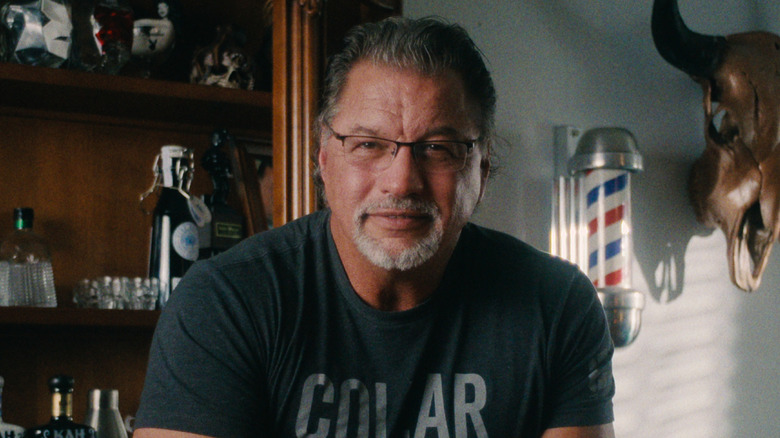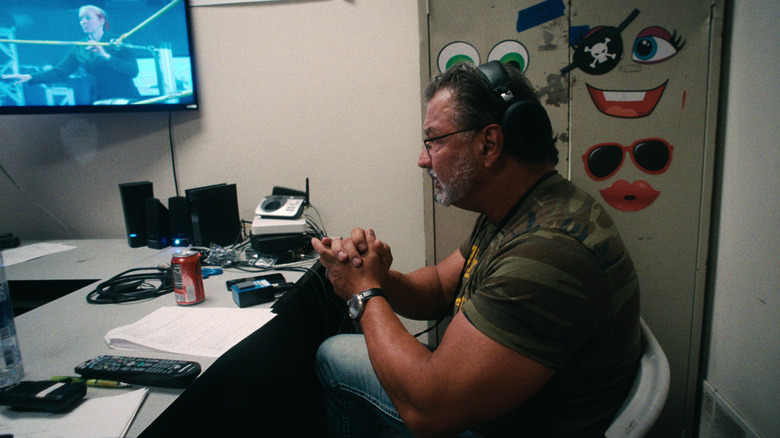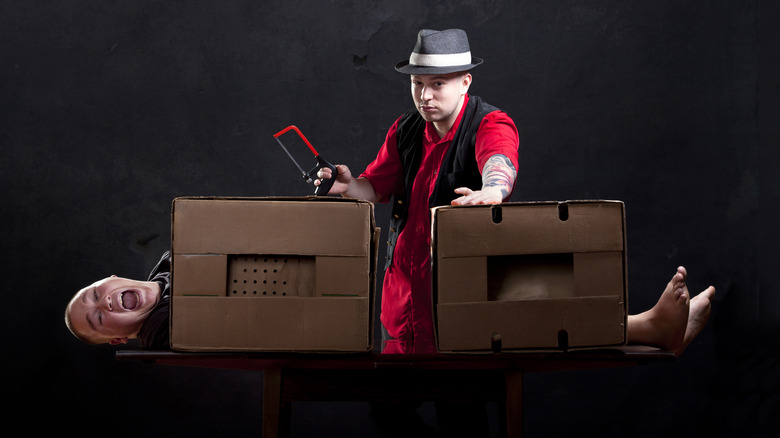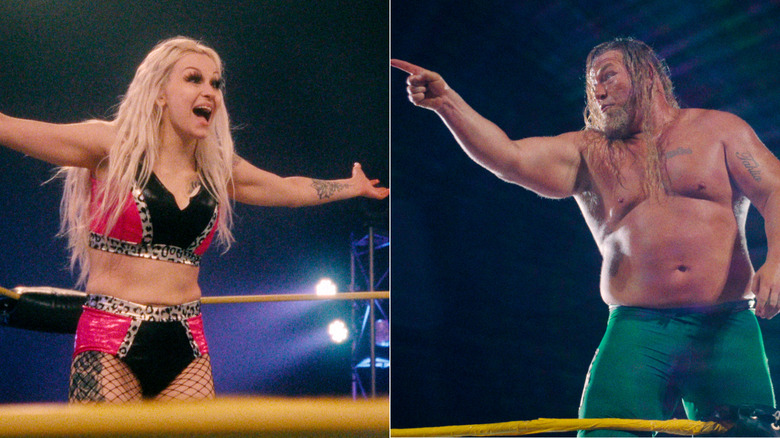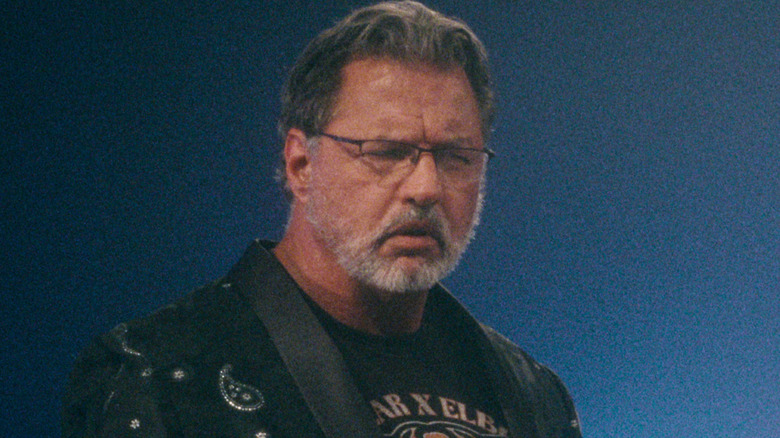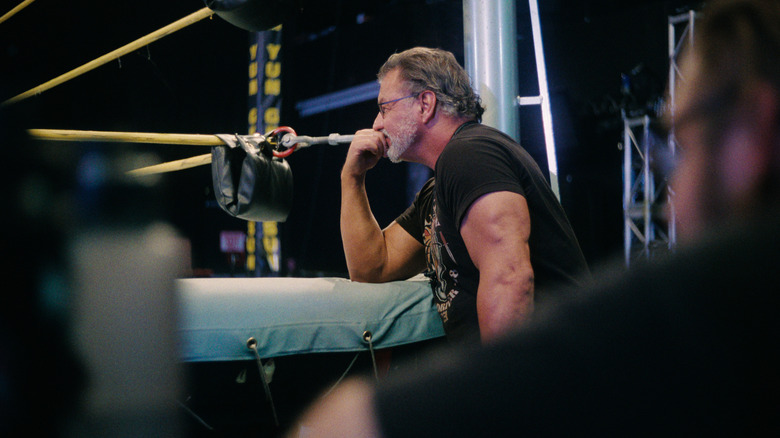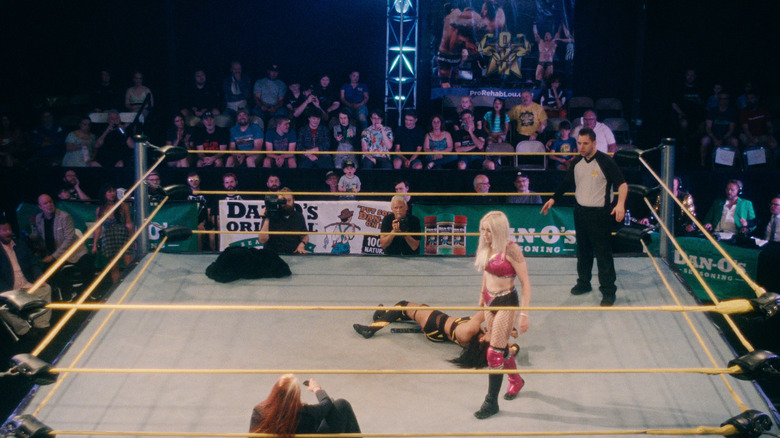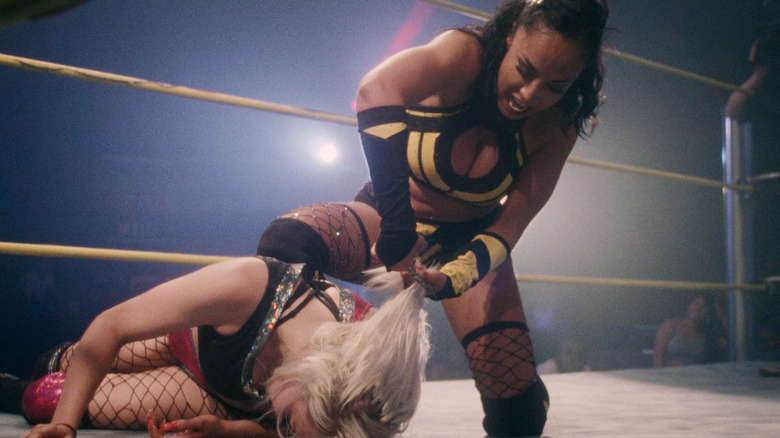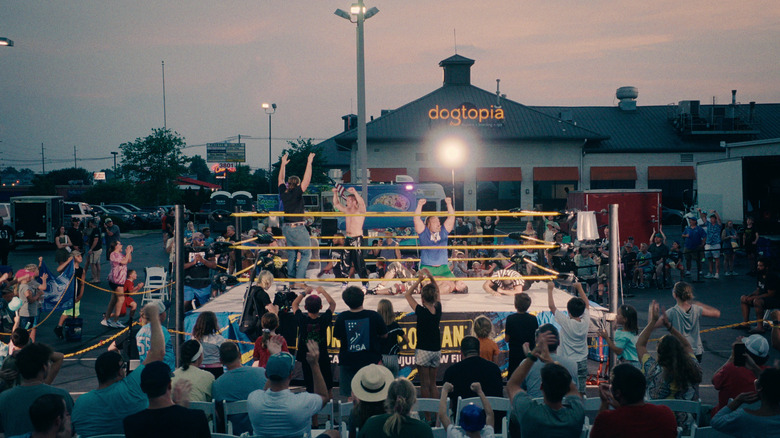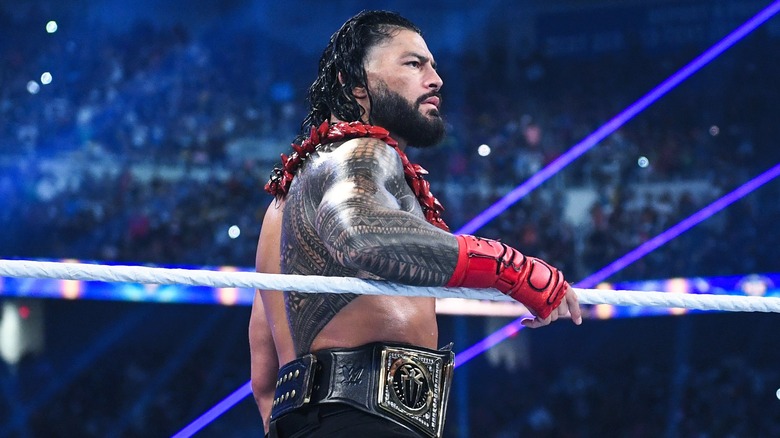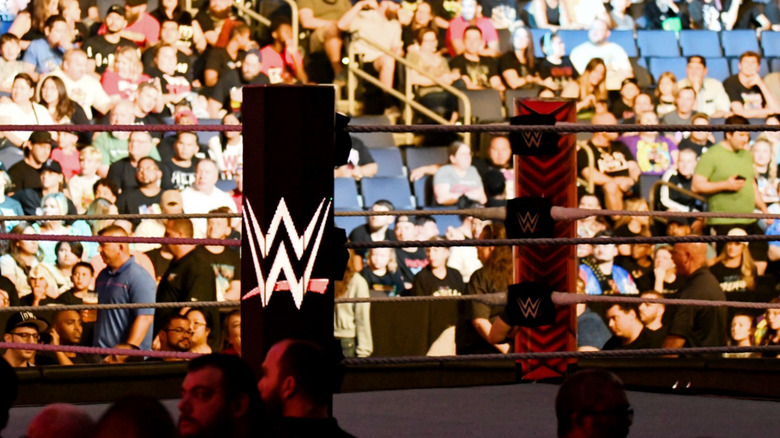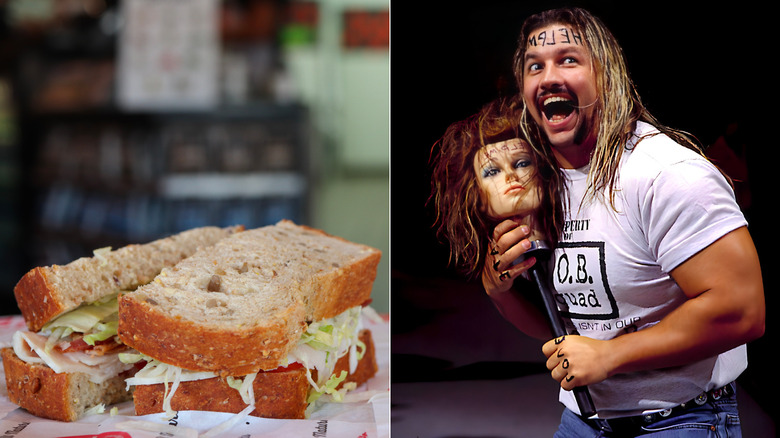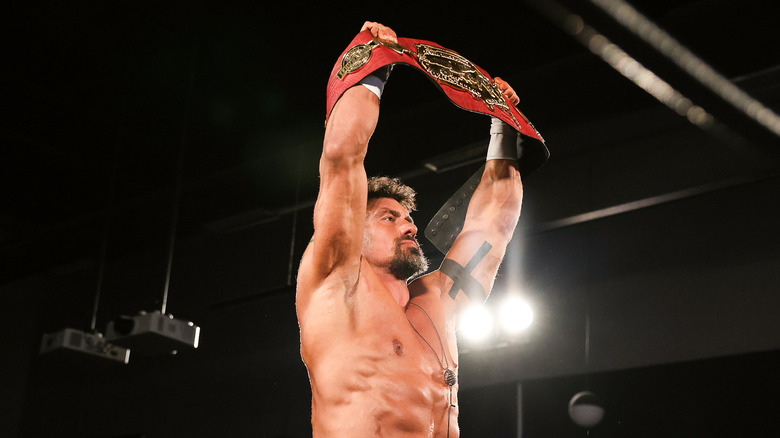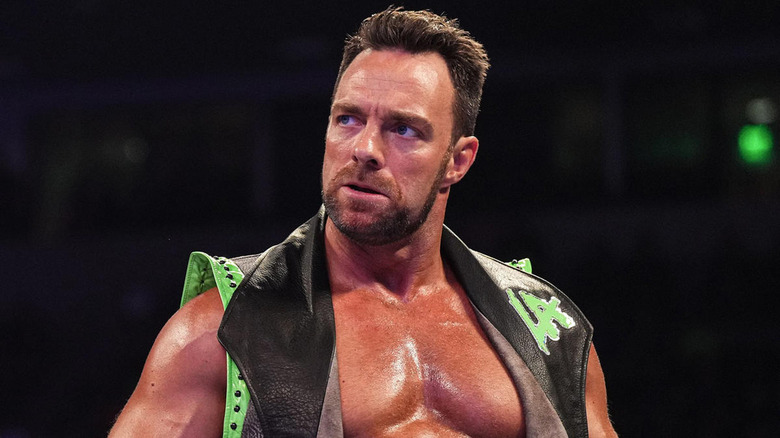Q&A: Al Snow On Netflix's Wrestlers, Hopes For OVW, WWE Deal & What You Need To Succeed
Al Snow knows more about wrestling than most people could ever hope to realize there is to know. Anyone who's talked shop with the WWE alumnus and head of Kentucky's Ohio Valley Wrestling (OVW) has no choice but to recognize it; the man knows his stuff.
While he never won a world title as a singles wrestler during his time with WWE — he captured the European Championship, the World Tag Team Championships with Mick Foley, and is a six-time Hardcore Champion — Snow speaks intelligently and eloquently about all aspects of the wrestling business and it's clear he knows what it takes to become successful. Listen to him talk about the unspoken agreement between performer and audience and its implicit promises and we dare you to say otherwise.
It could be tragically easy for fans who don't understand the industry or don't appreciate comedy wrestling to write Al Snow off, but to do so is to do him a major disservice and to do oneself an even worse one. He displays incredible passion and wisdom belied by the on-screen personae he's inhabited over the years.
Rather than keep this wealth of knowledge to himself, these days Al Snow — real name Allen Sarven — helps other performers hoping to make it big in the business at Louisville's OVW. One of WWE's previous developmental territories, OVW boasts a few alumni wrestling fans may have heard of — names like Brock Lesnar, The Miz, John Cena, Dave Bautista, and Randy Orton — and hopes to send even more to wrestling's biggest stages.
All of this is chronicled in Netflix's new streaming program "Wrestlers," which spotlights both Snow and the OVW stars who rely on his tutelage for their growth and success. Wrestling Inc. recently sat down with Al Snow to discuss the series, his 40-year history in the business, training the stars of tomorrow, the current wrestling landscape, and more. We challenge you to read this Q&A — or watch the show — and see if you still feel the same way about Al Snow.
Making Wrestlers
Kevin Tall: Beginning on a conceptual level, why did you want Wrestlers to be made? What do you think are the benefits here?
Al Snow: Well, as stated in the show, I'm a bit of a traditionalist and I really believe that for all things, I think there needs to be a little bit of mystery and magic left in the world and you don't need to pull the curtain back all the way, but I thought that this was a good opportunity to maybe ... if you were a wrestling fan already existing, that it might garner some new appreciation and respect for what we do and the challenges that the talent face on all levels, not just inside the ring, but also out. And my really sincere hope is that if you're not a wrestling fan, then just maybe it might capture your curiosity and really give you a chance to look at it for what it is. And maybe by doing that, I can grow the audience for not just OVW but for wrestling as a whole.
Okay. What's the flip side of that? Since you used one of my favorite metaphors, did you have any trepidation about pulling the curtain back on OVW for the docuseries?
Yeah, of course. I've used this as an example of ... It's like The Wizard of Oz. When you watched The Wizard of Oz and everything was magic and exciting and colorful and then you get to the end and you find out it was just some stumpy old man when you pulled the curtain back pulling knobs and twisting the levers and pushing the dials and buttons and pulling chains, basically orchestrating everything, and then the magic was gone. And I feel like sometimes our quest to really know things backstage that we really don't need to know to enjoy the show breeds familiarity, and familiarity breeds contempt and it takes away a little bit of the joy of just being a fan.
And there's nothing wrong with just being a fan, but some fans, I think they become so passionate about whatever they are watching, whether it be regular sporting events or movies or whatever, that they feel like they have to know more so that they don't feel like they're a fan, that they're actually a part of a business or an industry that they're not really a part of, which then now develops into becoming a critic of that business or industry that they once just loved for the pure love of it as opposed to now they have certain evaluations that have to be met so that ... certain standards that allow them to have some joy out of it.
Kayfabe
You touched on something else I think is really interesting. For years when kayfabe was still alive and well, the principal criticism of professional wrestling was that it's fake. We call it "scripted," obviously, because it's a much nicer word, but at its core it's theater, and you're talking about taking away the magic when you look behind the curtain. How important do you think that theatrical element is to wrestling in current day as opposed to when kayfabe was still alive and well?
I personally feel like kayfabe is still alive. Kayfabe, a lot of people misunderstand the term. It was a very non sequitur word that allowed us to just simply make sure that somebody that was in our midst was not smartened up or made aware of or had the curtain pulled back on him, and it was also a respect and it was an unspoken agreement. Contrary to popular belief, here in the United States alone since the 1940s, people have known that wrestling is predetermined and really as far as it being fake, the only thing that's fake about wrestling is just the outcome. That's it. Everything we do in the ring is quite real. Everything physically, and it's just our intent that you want to believe in, and that's the one thing we're selling you, is our intent.
And there was an unspoken agreement between the audience and us as performers. We were like, "Hey, we know you know that we know you know, but we're never really going to rub your nose in it, and you're going to be able to enjoy it and you won't feel stupid for believing." And then the audience was like, "Hey, we know you know that we know, and we know that you know that you can't abuse it and then make us feel dumb for spending our money, for wanting to believe and have fun."
It's like a magician. You watch Chris Angel who is amazing, just an incredibly talented illusionist, and the one thing that's intrinsically fake about magic is he's altering reality or defying the laws of physics. He doesn't stand on stage and pull the curtain back and while he is sawing a woman in half and go, "Hey," looking over his shoulder, "don't worry, guys. I got one girl up here and I got the other girl down here at the bottom and the blade's not coming anywhere near either one of them, so they'll be fine." It ruins the whole thing, but there are moments where if you pull it back in the right way and you allow a little bit of insight into the performers and the day-to-day operations and things, you hope that maybe it will capture more of a broader and more general and more Mr and Mrs. Walmart audience, and then you go back to close the curtain and let them have fun.
The wrestlers in Wrestlers
Switching gears a little bit, aside from yourself, Wrestlers, just the trailer alone focuses on two wrestlers, Haley J, and Cash Flo. What do you think is compelling about these two performers and their stories?
Well, I think both of them are very charismatic. I think that should be pretty obvious right out of the gate, and they catch your attention, they keep it and that's so valuable and important. And I think they represent ... Haley's at the very start and has all this promise and all this hope and Cash is further into it and this is his opportunity to maybe one day finally possibly take a step up and go to a higher level after all these years of grinding and hoping and performing, he now might be able to finally use this as a springboard that might get him an opportunity on a bigger platform.
Which nothing would thrill me more, I sincerely mean it when I say it. And it's not because I'm magnanimous and a saint of wrestling. It's a self-interested approach as well in that I truly want all of these people to succeed as much as possible because the more they do, the more I succeed as well and the more OVW succeeds. And they know this, and nothing would make me happier than to watch these people ascend to a larger platform and then maybe at some point return and now return the favor to other talent coming up.
Giving the old proverbial rub.
Yes.
Wrestling at 60
All right, so don't beat me up for this next one. You recently turned 60; how does it feel running the ropes these days and working in the ring?
Oh, fine. I'll be honest, I'm 60 years old and I pretty much live in pain to some degree or another every day that I'll wake up. If I don't, I'll ask my wife Jessica to kick me in the groin and I'd probably feel normal, so I'd be like, "Oh, okay, now I can function." But surprisingly, because I had both my knees replaced completely a year or two ago, I was thinking, "Boy that's really going to curtail things, but I'm able to move just as well." The only thing I found out is I have no vertical jump anymore. None at all. I used to have such a tremendous leaping ability and now I just ... I look like you threw a mattress out of a moving car. No aerial attacks, that's for sure.
Gotcha. Not going off the top rope these days. According to Cagematch, your first match was in 1982, and for your 40th anniversary in the business, you won the GLCW tag titles, and wrestled in nine more matches since then, including three in the last two months. How long are you going to keep this up? Have you considered hanging it up at any point or do you just not really think about it?
I know at some point I'm going to finally just call it in the ring, I'm going to call it quits. I always made a promise that I would never continue in the ring if I felt like I was an embarrassment. I won't do it. So far, and maybe I'm wrong, but I don't think I've gotten quite to that point. And some people still are interested in utilizing me in the ring, but I really don't do it that frequently or that often simply because I've got so many responsibilities with OVW and my focus really is OVW.
People made remarks or whatever that they feel like maybe I'm a little out of touch or whatever because I don't watch other wrestling. And I can assure you Vince McMahon doesn't watch other wrestling programs, and the reason why he doesn't is because he's so involved with and so focused on WWE, and you have to be to make whatever you're pursuing successful. And that's the same way for me. I just don't have the time or the opportunity. Every once in a while I do get to watch other wrestling programs, WWE, NLW, NWA, and get to check them out, see what they're doing. For the most part though, I'm just so focused and driven, trying to keep up with everything that's required to operate OVW that I just don't have much of a chance. Not to mention, I like to have a little bit of a life every once in a while, so my wife comes into a play at some point.
Learning by teaching
Your coaching experience also goes back for a few decades. How have your training methods changed over the years? What do your current students need to know that maybe your previous students didn't, and vice versa?
There's a lot more that I, of course with time and experience and multiple mistakes that I made that ... Where it really struck me where I had missed opportunities or made mistakes or didn't capitalize fully on the things that were presented to me at the time, was when I was first brought down to OVW and I started instructing the talent on what they needed to do to capitalize on their opportunities on that platform that WWE is.
And then I would literally have epiphanies constantly where I'd be like, "Oh, that's what I did, oh." And it would just hit me that here I am telling them to not do something based off of what I did. And then it really started to sink in and really started to see the mistakes and better helped me to know what to have the talent focus on trying to learn if they really wanted to be truly successful, not just get an opportunity and have a run of six months to a year or two years, but work your way up the card and be that next major attraction that gets to call the shots and has opportunities outside of the wrestling ring into other avenues and venues that allow you to just continue to ascend as a star.
So teaching, it sounds like, is very much a learning experience itself.
Absolutely. If you really want to learn anything, teach it. The more you teach a particular thing, a subject, a skill, an art, the more you will become adept at performing it. Absolutely.
Not naming names
Alright. OVW's got some notable alumni, just a few that have done a few small things in the professional wrestling industry.
A handful, a handful.
Who do you think is currently there that you think could potentially reach that ultimate stage?
Gosh, here's the thing. One, I don't want to mention any names because somebody will always get offended and be like, "Well, what about me?" But sincerely, I really think, and this is from my perspective, I think that everyone here has an opportunity to do and go to some level in WWE, absolutely. And I think that they could be a positive addition to WWE no matter what level on the playing field they were put at, and I think they would stand out. I think they have a better understanding and they relate better to what it is that they're really supposed to do as far as once they get out on a platform, and how best to utilize that to make themselves either the attraction or an attraction that helps motivate an audience to pay to see the attraction.
Quite honestly, those are the only two things that as a performer you serve a purpose. Your purpose is either you are the thing that sells the tickets and motivates an audience to watch TV and buy merchandise, or you're one of the things that help. There is no third option in wrestling. And in the real struggle, especially as you ascend up the ladder, is that you're only as good as the last time you performed, and you're always being evaluated and judged on your ability to do one of those two things. And you better be able to deliver or you're not going to get many opportunities to do it.
Doing the favor, not doing the job
How important is it to balance those two things in a reciprocal way with your fellow performers?
Very much so, because this is such a ... I've talked about this before, wrestling, it's a very quirky, dichotomous business in the sense that as a performer you're solely out for yourself, but as a performer you can't do anything by yourself. So you need the whole show to be a star. You need to go to the ring, and that really is your thing, is you need to be a star when you go out there, you need to be an attraction. But you can't do it without the help of somebody else in the ring who also wants to achieve that same thing at the same time.
And it doesn't work unless you truly understand the intrinsic things about professional wrestling from the business side, of knowing when it's a particular talent's time, and now every other talent on the roster have to be willing to take a step back to elevate that one talent that for whatever reason is the talent that ... When it's Steve Austin, the rest of the card have to unspokenly agree that we're going to do everything we can to elevate Steve to the very same place we all desperately want to be, but for whatever reason, for right now, at this moment, he's the thing. And we've all got to make that decision to help him because the more he goes to the top and the more of an attraction he becomes, the more overall the money comes into the arena, and the more money all of us all make together. And then there'll come a day, and that's why we don't call it doing the job, which is such a dumb term. It just frustrates me when I hear people using vernacular that they have no idea what it is. It's called "doing the favor."
And the reason it's always been called doing the favor is because it's expected at some point it will be returned. Because no matter how much or how over Steve Austin is, he's a product, he has a shelf life, and he's going to have a run, and now we've got to find the next thing that we need to put up on the shelf. And now Steve's got to take a step down or a step back, he's got to minimize himself so that we can give an opportunity to that person to be the thing. And that's how a healthy promotion should operate.
It was easier in the old days
In the old days, it was a little bit easier because you had ... it was a regional territorial situation and it really enabled a wrestler that he had a run in, I don't know, in Ohio and Michigan. And that run at some point comes to an end and he goes down to Florida and he works for a little while and then he goes over to Tennessee and then he goes up to New York and then he eventually goes back and he's an even bigger star in Ohio and Michigan because now he's fresh again. He's not there wearing out his welcome.
And I made this suggestion and everybody pooh-poohed it because I don't think personally it's ridiculous, but as far as WWE is concerned, you have a Randy Orton and what an immense and amazing talent he is, but you can only watch him so much and at some point you're like, "Okay, give me somebody new." Create seasons for these talents. Make an agreement that you're going to make creatively, "Hey, we're going to use ..." with a caveat that if he gets hot, if he's starting to ... it's really drawing interest, keep him longer. But hey, he's going to have a six-month run and you're going to push him and you're going to put him in there and you're going to use him on TV, you really want to build him.
Now after that six-month run, you take him off TV, he does a little three-month stint on just the live events because you want to get that money that you put in on TV out of him. Now for the next three months, four months, he sits at home, he heals up, he has a better attitude, he gets time with his family, and now when you bring him back, he's fresh again. He's brand new and he reinvigorates the roster again because he's now not been there every single week.
And let's face it, that same tactic is being used with Roman Reigns, with Brock Lesnar; Undertaker, it worked beautifully with for so many years and it drew out his drawing ability because he was no longer there on a regular basis just wrestling just anybody. And it kept him to being an attraction. And I really think if they were to schedule seasons for these wrestlers on that level of the WWE, you'd avoid the burnout, the physical trauma, and ultimately you'd have a much better morale and you'd have much better performance and potentially more money coming in at the live events and on television, et cetera.
Remaining a threat
Okay. You're touching on a concept like overexposure and I think your plug-and-play mentality is very interesting, but you had mentioned Roman Reigns. You think he fits that mentality or do you think he's in contrast to it, given his current title situation and how he's being used on TV?
Okay. It's not a matter of overexposure. This is another problem. Let's say you want to use Roman Reigns or you want to use a Brock Lesnar on a weekly basis, who's he going to wrestle? Who is he going to go out there on a weekly basis that's going to keep your interest and that you are going to have some kind of what we call heat, interest, desire to see. What kind of opponents are you going to generate that he's going to be able work with on a weekly basis that are going to elevate him, that when he beats them, you feel like he did beat somebody? Or let's be honest, if somebody beats him too often, too frequently, then what's he mean? Because now anybody can beat him. He's no longer that big monster threat that he is right now, and that's a large part that allows to keep a talent like that.
That was why Andre the Giant was a traveling attraction. Because if you brought ... Andre was a good example, Bruiser Brody was a good example, Abdullah the Butcher was a good example. They were traveling attractions that came into a territory and then were there for a particular run and they left because ultimately at the end of the day, the longer they stayed, the more the shine went off of that attraction because now they became just like everybody else on the roster, and really who are you going to have them work with to elevate them and make them stay that monster threat without taking them out in a way, periodically.
The biggest star in wrestling
Fair enough. Who do you think is the single biggest star in wrestling today?
The single biggest star in wrestling? Probably Brock Lesnar, I would say. I would say probably Brock Lesnar, without a doubt. I would really, really say that he's a guy that Mr. And Mrs. Walmart know his name, and then a close second would probably be Roman Reigns. I'd say he's a close second, but definitely more people know of Brock Lesnar, or would be interested in paying to see Brock Lesnar in some manner. And that I think is why he's probably the number one.
Brock Lesnar makes for a great segue; he occupies a very interesting space in the industry, because he comes from the amateur wrestling background and he made his name in professional wrestling, but he also transitioned over to UFC as well. Given the space he occupies and the recent merger just the other day with WWE and UFC, I am curious to know your thoughts on the Endeavor deal that just closed, since Brock represents both sides of that coin.
Yeah. I think it's fascinating. I thought I would never live to see the day that Vince McMahon would sell the company. I think that it speaks to the genius that is Vince McMahon. I know that a lot of people don't want to hear that, but you've got to respect the man. Let's face it, there was clearly ... what we have to assume is a coup, forced him out. He took leave, left the company, came back, put himself in a position where he could sell the company, was able to sell it for about $4 billion higher than the valuation that was given for the company, and then got himself a contract to where he could never be fired. Brilliant. Just brilliant. On top of growing that mustache. So you got to admire it. I think that it's a little scary because ... But you've still got Vince involved, I would imagine.
When you have non-wrestling people ... because let's understand, the wrestling business is like every other business, and it's like no other business. For instance, on this very simplistic level, if you get a Jimmy John's franchise, well, you just got to market your sandwiches and your sandwiches [have] got to be good. Hey, you should be able to have a profitable business. In wrestling, like here, my sandwiches all have egos, they all have insecurities, they all have their own agendas, and I've got to manage all of those sandwiches to get them to market themselves and make the audience want to buy my sandwiches. I'm totally reliant once they walk through the curtain, contrary to popular opinion and belief, it is 100% the onus is on the wrestler. No ifs, ands or buts, the wrestler makes themselves a star. Vince McMahon doesn't make them a star. Vince certainly can help, but Vince provides a platform and then the wrestler then has to go out there and do the rest. And that really is what it comes down to.
Selling great sandwiches & maintaining the illusion
And, "I just make really good sandwiches," well, we just got to get the word out that they're really good sandwiches, but my sandwiches have to do it on their own. And that's where if you don't understand that and you don't know how to operate that, then it's going to be very difficult and could be damaging to the wrestling business as a whole because, also unlike any other business, what happens, poop doesn't roll downhill here. It usually 9 times out of 10, it hits the fan and splatters everyone. And that's just how it goes, because we're in the business of creating and maintaining an illusion that WWE or PBW or ... you put three letters with a W in it are a governing body, a sanctioning body over a group of price fighters, and then the wins and losses have a consequence that are based on contractual obligations that are committed to, and then allow that wrestler, if he wins, to gain a certain amount of money and if he loses, he goes hungry.
And that's relatable for an audience, that's a very relatable thing. But we have to maintain that illusion, which is back to the kayfabe question, because if we help you and we sell that illusion to you and you buy it, the last thing you want is for us to then violate that illusion and take away all the entertainment that you were able to get out of it just because you were able to believe in that concept. And with UFC getting involved, I'm sure there will be some hiccups and things along the way, but I really feel confident in Vince's ability to be able to navigate that and come out stronger on the backside of it.
Alrighty. Well, I have more than doubled my allotted time. I want to thank you for talking to me today.
Oh, thank you.
I do have one more quick question before I let you go.
Sure.
Swimming below the surface, ready to make a splash
Outside of OVW, are there any performers that you think are swimming below the surface right now that are just right about able to maybe break through and become a major star?
Yeah. I think that there are quite a lot of them. I have to admit, and he's here in OVW and he just recently got the NWA world title, and that's EC3. EC3 quite honestly, was the only homegrown star that Impact made. AJ styles, Samoa Joe, Eric Young, all those guys, incredible talents. They didn't really reach that stardom level until they were in other places like WWE. That's just a fact. And Impact was never able to elevate them to that point, or they never took that platform and utilized it to its fullest extent to do it. But EC3 was the one guy that was truly made into an attraction and a star there in Impact and nowhere else. And I'm surprised, I was shocked that WWE missed that or it didn't work, it didn't connect or click, and I don't know why, but I think that he has a great opportunity to do it again and can always go back and reinvent himself. Look at Drew McIntyre, look at Cody Rhodes.
I got a lot of flack when Cody quit the first time and I said, "Well, good for him. He has an opportunity to leave on his terms and then he'll probably come back in a better position, a better spot." And everybody's like, "How dare you? That's insane." And I'm like, "No, it's not. That's always been the wrestling business." This weird concept that wrestlers get fired is insane because we don't, we're never hired, it's a business relationship between the promoter and the wrestler. And you come in and use the platform as a commercial to sell your product, which is you. And the promoter provides that, and then together with ... the promoter capitalizes on and exploits along with you, whatever it is you've manifested once you go through that curtain so that together you both make money. And that's always been the way and it always will be the way. It doesn't change.
Being described in a sentence or less
And you've got that classic show business maxim, "Leave them wanting more."
Yes, absolutely. Always leave him wanting more. But I saw LA Knight, I commented ages ago about his potential to be a star. I really saw that in him and I'm glad to see that other people are now starting to see it as well. And sometimes it just takes being in the right place at the right time. I was 18 when I got in the business and even then, guys who had been working for 10 or 12 or 15 years and they'd be like, "Look kid, you're probably not going to make any money, real money, until you're probably in your mid- thirties," because it just sometimes takes that long for you to identify who you are.
Because if you really want to be a real star, a real attraction, you've got to be two things. One, completely authentic. People have to believe in who you are. Number two is you've got to be a persona that somebody in the audience can turn to, who are friends and family have never watched wrestling and go, "You got to watch this guy, he's A, B, C, D, E." Boom. You have to be describable in a sentence or less. The more you are describable in a sentence or less, the more of an attraction and a star you really are, simple as that.
That's not an opinion, that's not "Oh, you really like ice cream. You like chocolate, I like strawberry." That's a fact. You could go down the list of people, whether it's in wrestling, it's acting, it's musicians, it's boxing, MMA, every single person that's a real attraction, an actual draw, is somebody you can describe to your friends in half a sentence.
Alrighty. Al, thanks so much for talking to me today. I really appreciate it.
Oh, thank you. Thank you for the time. I really appreciate it as well.
"Wrestlers" is now available to stream on Netflix.
